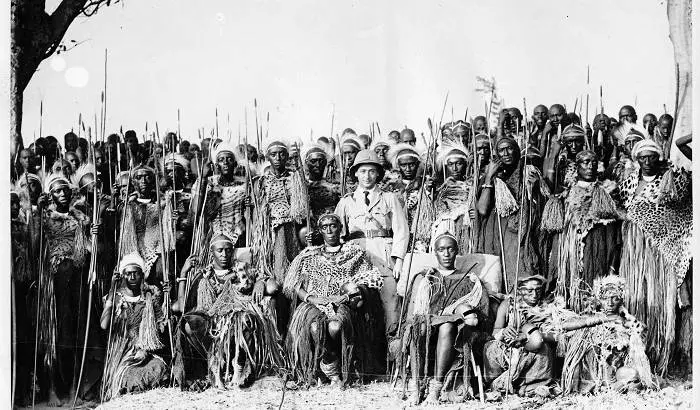
When World War I broke out in 1914, Germany occupied Tanzania, Burundi, and Rwanda under the Deutsch Ostafrika geographical unit, while Belgium occupied Congo and England occupied Uganda. Nobody could have predicted that the war would escalate to the point where Burundi would be affected. How did things look on the ground? Let us see it together.
This is a summary of an article by Jean Pierre Chrétien published on cairn.info about the situation in Burundi during World War I.
Following the outbreak of the war in Europe, the Belgians and British in the region kept an eye on the Germans to ensure that they did not raise their heads. Especially since it’s Germany that started the World War against European countries, particularly Belgium, the United Kingdom, and France.
In the region, provocation of the Belgians by Germany began in 1914, when Max Wintngens, commander of German soldiers in Rwanda, decided to attack Belgian soldiers in Congo, at Idjwi in Nord-Kivu. In 1915, Max Wentzel, the leader of German soldiers in Burundi, led 15 German soldiers and 111 Burundians in an attack on the Belgians at Luvungi in Congo, but he and his men were badly beaten because he did not prepare well. One of the two machine guns he was using stopped working. Schimmer, a German resident in Burundi, was killed in the attack. The attack also exposed the German soldiers’ frailties. The Belgians had already determined that the Germans were vulnerable and had begun to plot ways to attack them. The plan was about to seize the German-owned railway Tabora in Tanzania in order to prevent them from returning to Europe and assisting their relatives who were fighting in Europe.
At the time, Germans faced a serious problem: it was difficult for their leader, who was in Tanzania, to give orders to those in Gitega, Burundi. It would take a month for his order to be delivered. The message from Dar-Es-Salam will be delivered to Kigoma via the highway. Boat from Kigoma to Usumbura. Once in Bujumbura, messengers could walk it to Gitega, which would take between two and three hours. This would cause the German soldiers in Burundi sometimes to hesitate on what to do whereas the time were tense.
The Belgians and English launched the assault in unison.
Charles Tombeur, commander-in-chief of Belgian troops in Congo, and Frederick Jackson, commander of British forces in Uganda, agreed on an attack plan against the Germans. They agreed that the first group of soldiers would attack Burundi from the Congo via the Rusizi River, crossing Bujumbura called Usumbura at that time, and the second group would attack via Rwanda, taking Gitega. The first group arrived in Burundi from the west on June 5, 1916. They crossed the Mpanda River and arrived in Kajaga, where there was a German garrison, on June 6, the evening the Belgian flag was hoisted for the first time in Burundi. That group pursued the Germans in Bujumbura before taking the road to Gitega.
On the 6th of June, another group attacked from Rwanda, heading for the king’s palace in Bukeye. However, they encountered on their way Germans who launched sporadic attacks on them, but their attacks were ineffective and did not deter the Belgians from continuing their journey to Gitega. When they arrived in Gitega on June 17th, they discovered that the Germans had already fled and were on the run. That is why, without breaking a sweat, they took over the country’s capital at the time, Gitega.
German colonists practiced a very harmful dictatorship before Belgians took on Gitega. For example, Resident Helmut Wolf imposed a one-rupiah tax, with the proceeds going to Germany in their fight against the British and Belgians in the region. Every family would receive one rupee. It was the first time a tax was imposed in Burundi, and citizens revolted, particularly Mugugu of Rumonge, who organized a public revolt only to be executed by hanging on March 17, 2022.
The hostility between missionaries and colonists was a deciding factor in the fightings setup
While the war was raging between European countries in Europe, missionary priests and Protestant pastors worked hard to ensure that indigenous people were unaware of what was going on.
But some mission workers realized something was wrong, especially since the majority of the missionaries were French and the colonists were German. The mission workers who were close to the missionaries could sense the hostility between missionaries and colonists.
Despite the fact their countries were fighting at times, it did not prevent missionaries and colonists from working together. An example is when the king of Burundi Mutaga Mbikije died on 1st December 1915, the German ruler of Burundi called the pries of Mugera Mission Henri Bonneau to help him elect a king. It was at that time Mwambutsa Bangiricenge was elected king.

However, missionaries were concerned about the course of events. There were only five Catholic missions in Burundi at the time: Muyaga in the east, Mugera in the center, Kanyinya in the north, Buhonga in the west, and Rugari in the north east. In Kanyinya, for example, workers would be hidden because they had received some education and would be used by German colonists during the war. They had information in Mugera that the Germans wanted to escape to Mugera while being pursued by the Belgians and build a “fortress.” They feared that if that happened, they would bomb the colonists.
In Muyaga Father Leport, a French didn’t bother giving assistance to german Dietrich Burwig called Bigingo when he was attacked by the Belgians. when the Belgians had already arrived in the eastern part of the country, they heard that there was a German living in that part and he had his troops, so they sent messengers to him to ask him to stop the attacks. When he learned that the Belgians had arrived in the area, he asked Father Leport for advice on what to do and Father Leport told him that he would resign to Belgium soldiers, the German rebuked. When the messengers sent by belgiums arrived to him he shot their leader and jumped into the Ruru river in Ruyigi province to escape but they shot him there. They took him out and cut off his skull and head and he was buried on the day of the Muyaga Parish domain.
Belgians pursued the Germans beyond the Burundian border into Tanzania. They engaged several Burundians carrying luggage in this pursuit, killing them at the first sign of fatigue. The testimonies gathered reveal a disastrous situation for Burundians who have been cut off from their mountain climate and milk-based diet.



